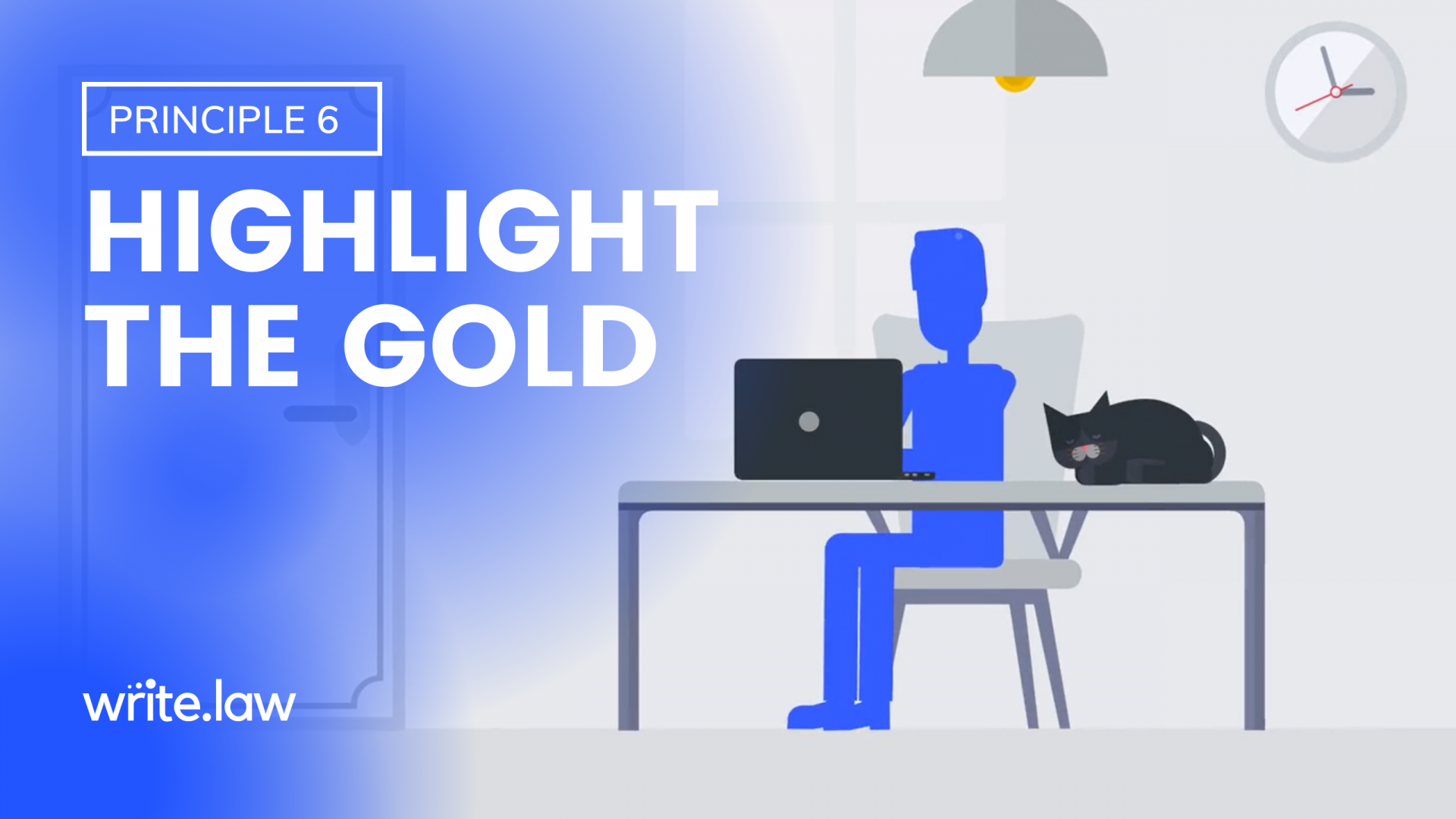Writing
Legal Writing Principle 6: Highlight the Gold
Learn to highlight the information that provides the most value to the reader and conveys the author's strongest arguments.
-
Joe Regalia

Neuroscience tells us that we remember things best when they stick out from the things surrounding them. We remember what’s different. The science also tells us that we’re persuaded by what we remember.
The takeaway: If you want to persuade, pick out the gold in your document and put it in neon lights so that it stands out from the noise. Your readers will be a lot more likely to remember these key points and, in turn, more likely to agree with you.
So how do you highlight that gold? The best way is with your writing style. People remember—and treat as more important—pithy writing. Vivid verbs, balanced sentences, and rhetorical flourish end up really mattering in the persuasion game. So take the extra time to use engaging and excellent style for the points you really care about.
These judges and attorneys all get the power of highlighting the good stuff:
Echo Words
Defendant devoted his life to those selfish people, for their selfish cause, and with his own selfish motives.
It turns out that, in the area of immigration and naturalization, the ‘unthinkable,’ ... was exactly what the Court had been thinking for more than one-hundred years.
Simile and Metaphor
To take the period of limitations from one statute and the accrual date from another, however, is like grafting a giraffe’s head onto an alligator’s body.
Isocolon or Sets of Balanced Phrases or Sentences
The plaintiff’s argument failed before. The plaintiff’s argument will fail again.
Dependent-Clause Clusters
Because it may seem difficult at first, because it may sound awkward or forced, because it often creates lengthy sentences where the thought gets lost, this pattern seems forbidding to some writers, but it isn’t all that hard.
Places of Emphasis
Another way to highlight is to insert the good things into the places of emphasis in your writing—the places that readers are most likely to read carefully and notice:
-
The introduction.
-
Each heading.
-
The beginning and ending of each section (introduction, fact, and analysis sections—really any standalone piece of your document).
-
The first sentences of a paragraph, and the last one, too.
-
Visuals, charts, or graphs just beg to be looked at.
-
Your conclusions.
Take the beginning of paragraphs. Readers pay a lot more attention there than they do in the middle:
For one thing, the plaintiff blew the deadline by ten days. The statute that applies in this state required filings to be made in six months. The plaintiff filed on January 15th, 2018, ten days after the six-month deadline of January 5th.
Or take the end of sentences. Whatever idea you put there is instantly highlighted:
“Steve died in Seattle two weeks ago.”
“Steve died two weeks ago—in Seattle.”
“Two weeks ago, while visiting Seattle, Steve died.”
Examples and Hypotheticals
You can highlight important points by spending more time conveying their details and setting up a story. Examples and hypotheticals are also powerful ways of highlighting a bigger concept. Look at how this lawyer highlights the size of a class in a class action lawsuit using an example:
[The class] is more than 1.5 million women, a group that outnumbers the active duty military personnel in the Army, Navy, Marine Corps, and Air Force combined. The size of the putative class exceeds the entire population of at least 12 of the 50 states.
Or Justice Roberts doing the same in a famous refrain:
Determining the best control technology is like asking different people to pick the best car. Mario Andretti may select a Ferrari; a college student may choose a Volkswagen Beetle; a family of six a mini-van. A Minnesotan's choice will doubtless have four-wheel drive; a Floridian’s might be a convertible. The choice would turn on how the decisionmaker weighed competing priorities…
Direct Dialogue
Direct dialogue can also engage your reader and make them pay attention to something important:
Imagine a friend told you that she hoped to meet "an actor, director, or producer involved with the new Star Wars movie." You would know immediately that she wanted to meet an actor from the Star Wars cast—not an actor in, for example, the latest Zoolander.
...
Don't expect your reader to remember what you think matters. Use the above techniques to highlight your important ideas, facts, and arguments in flashing neon lights.
Joe Regalia
Write.law co-founder Joe Regalia combines his experience as both practitioner and professor to create exciting new ways to teach legal skills. Learn more about Joe
Sign up for our newsletter!
Get writing and other legal practice tips delivered to your inbox every other Thursday.
Thanks for joining!
We’ve sent a welcome email to your inbox.
We’ve sent a welcome email to your inbox.
We're on a mission to make legal skills training engaging, effective, easy to use—and accessible to all.


